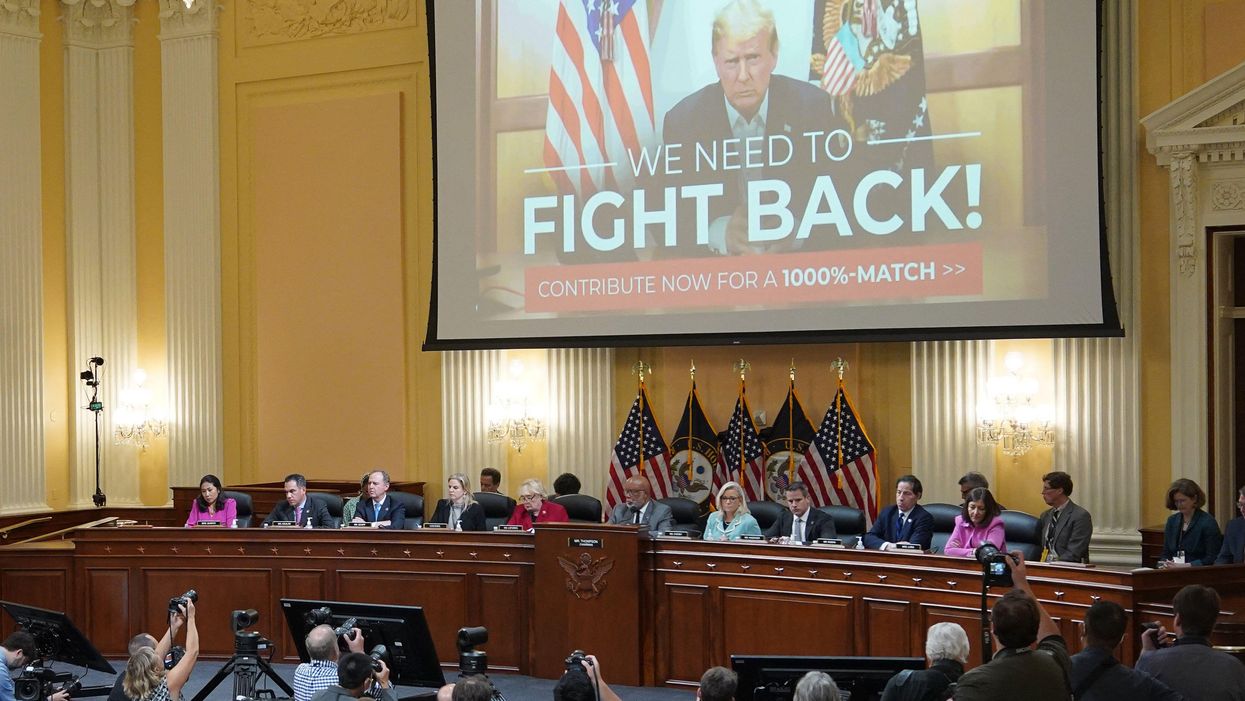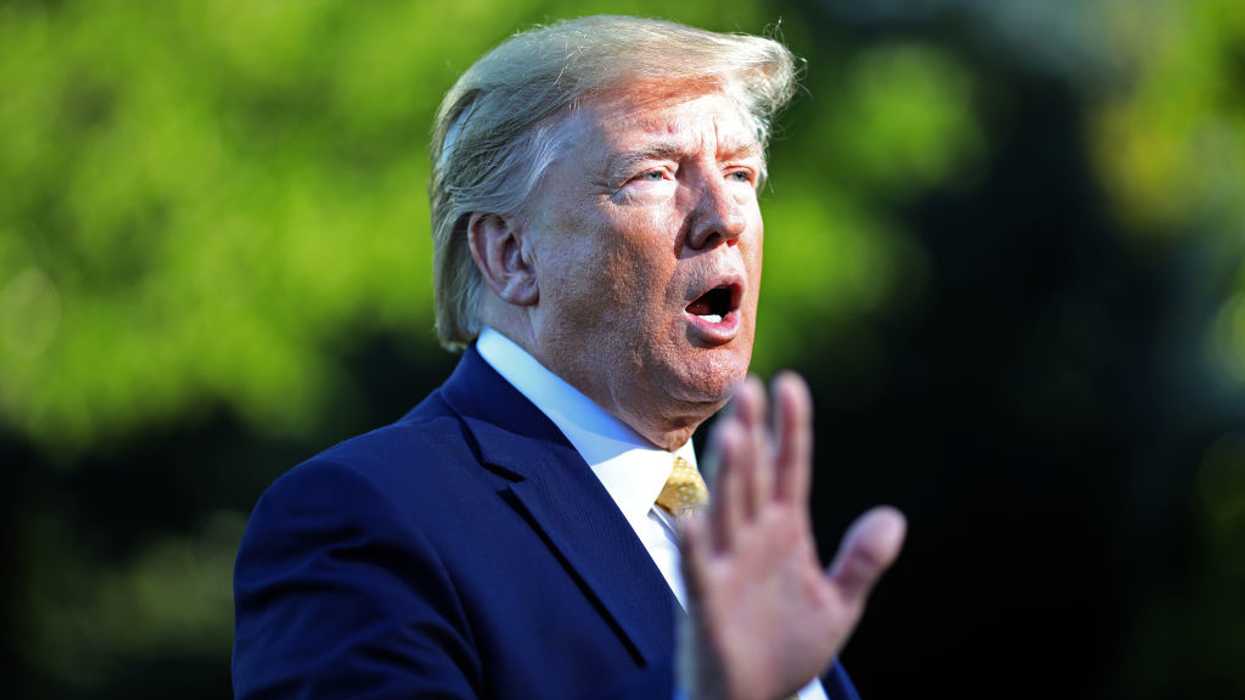Former President Donald Trump’s disregard of legitimate electoral outcomes has been on public display for the past week, conjuring memories of his first impeachment and reminding democracy advocates of his willingness to break democratic norms.
On Monday, the House committee investigating the Jan. 6, 2021, riot at the Capitol held its second public hearing, as some Trump allies and members of his campaign team testified that they had advised him to not declare a victory on election night.
Trump nevertheless went on to claim the election had been stolen from him and held a “Stop the steal” rally the day Congress was scheduled to certify the election. The insurrection followed on the heels of that rally.
“Trump’s lies continued to stoke the anger of his staunchest supporters – anger that he would turn loose on the Capitol on January 6, in an effort to overturn the election he lost by force,” said Common Cause President Karen Hobert Flynn.
Others drew a parallel between Trump’s unfounded claims of fraud and his dealings with Ukraine in July 2019.
Trump’s first impeachment centered on an inquiry into his phone call to Ukrainian President Volodymyr Zelensky in which he appeared to have asked for assistance finding information on Joe Biden in exchange for military support. Although he was acquitted, Trump’s actions as president would continue to raise allegations of corruption, including possible tax evasion and election tampering.
In fact, the Jan. 6 hearings are the third attempt to investigate possible corruption by the former president.
“His entire presidency is a clear indication that he believes himself to be above the law,” said Lisa Gilbert, vice president and co-founder of the Not Above the Law Coalition. The call to Ukraine was “one of the numerous instances of [Trump’s] breaking of ethical norms and mores.”
McGeehee, who was executive director of the crosspartisan advocacy group Issue One before launching her own consulting firm, said “the Ukrainian call became part of a pattern where we had a president who really failed in that aspect” of putting the interests of the nation over his own.
While the Jan. 6 hearings are intended to hold him accountable in a political sense where the two impeachments failed, McGeehee believes that any attempt to criminally indict Trump could end disastrously for a deeply divided country. Trump’s supporters believe themselves to be on “a moral crusade” for the former president.
In the aftermath of the Trump presidency and in the midst of a pandemic, public trust is at a low point, with about three-fourths of U.S. adults concerned about American democracy, according to a recent poll by YouGov. McGeehee highlighted that fragile state of democracy, explaining that high inflation and extreme polarization are historical markers of instability but noted that Republicans are participating in the hearings too.
“There's a reason that this is bipartisan, this hearing,” she said. “You know, people on both sides of the aisle understand that it is incredibly problematic to tell lies in the public square, and to in turn, have those lies incite violence.”
Gilbert, who is also the executive vice president of progressive consumer rights advocacy group Public Citizen, also found some solace in the committee’s work.
“I think that the importance of these hearings is showing bipartisan cooperation and sharing facts, shocking facts, with regular people,” she said, hoping the hearings will “lead to accountability for the bad actors, as well as reforms to improve our system moving forward.”
The committee had been planning to hold another hearing Wednesday but it was delayed by technical issues. The next hearing will be conducted Thursday.



















Eric Trump, the newly appointed ALT5 board director of World Liberty Financial, walks outside of the NASDAQ in Times Square as they mark the $1.5- billion partnership between World Liberty Financial and ALT5 Sigma with the ringing of the NASDAQ opening bell, on Aug. 13, 2025, in New York City.
Why does the Trump family always get a pass?
Deputy Attorney General Todd Blanche joined ABC’s “This Week” on Sunday to defend or explain a lot of controversies for the Trump administration: the Epstein files release, the events in Minneapolis, etc. He was also asked about possible conflicts of interest between President Trump’s family business and his job. Specifically, Blanche was asked about a very sketchy deal Trump’s son Eric signed with the UAE’s national security adviser, Sheikh Tahnoon.
Shortly before Trump was inaugurated in early 2025, Tahnoon invested $500 million in the Trump-owned World Liberty, a then newly launched cryptocurrency outfit. A few months later, UAE was granted permission to purchase sensitive American AI chips. According to the Wall Street Journal, which broke the story, “the deal marks something unprecedented in American politics: a foreign government official taking a major ownership stake in an incoming U.S. president’s company.”
“How do you respond to those who say this is a serious conflict of interest?” ABC host George Stephanopoulos asked.
“I love it when these papers talk about something being unprecedented or never happening before,” Blanche replied, “as if the Biden family and the Biden administration didn’t do exactly the same thing, and they were just in office.”
Blanche went on to boast about how the president is utterly transparent regarding his questionable business practices: “I don’t have a comment on it beyond Trump has been completely transparent when his family travels for business reasons. They don’t do so in secret. We don’t learn about it when we find a laptop a few years later. We learn about it when it’s happening.”
Sadly, Stephanopoulos didn’t offer the obvious response, which may have gone something like this: “OK, but the president and countless leading Republicans insisted that President Biden was the head of what they dubbed ‘the Biden Crime family’ and insisted his business dealings were corrupt, and indeed that his corruption merited impeachment. So how is being ‘transparent’ about similar corruption a defense?”
Now, I should be clear that I do think the Biden family’s business dealings were corrupt, whether or not laws were broken. Others disagree. I also think Trump’s business dealings appear to be worse in many ways than even what Biden was alleged to have done. But none of that is relevant. The standard set by Trump and Republicans is the relevant political standard, and by the deputy attorney general’s own account, the Trump administration is doing “exactly the same thing,” just more openly.
Since when is being more transparent about wrongdoing a defense? Try telling a cop or judge, “Yes, I robbed that bank. I’ve been completely transparent about that. So, what’s the big deal?”
This is just a small example of the broader dysfunction in the way we talk about politics.
Americans have a special hatred for hypocrisy. I think it goes back to the founding era. As Alexis de Tocqueville observed in “Democracy In America,” the old world had a different way of dealing with the moral shortcomings of leaders. Rank had its privileges. Nobles, never mind kings, were entitled to behave in ways that were forbidden to the little people.
In America, titles of nobility were banned in the Constitution and in our democratic culture. In a society built on notions of equality (the obvious exceptions of Black people, women, Native Americans notwithstanding) no one has access to special carve-outs or exemptions as to what is right and wrong. Claiming them, particularly in secret, feels like a betrayal against the whole idea of equality.
The problem in the modern era is that elites — of all ideological stripes — have violated that bargain. The result isn’t that we’ve abandoned any notion of right and wrong. Instead, by elevating hypocrisy to the greatest of sins, we end up weaponizing the principles, using them as a cudgel against the other side but not against our own.
Pick an issue: violent rhetoric by politicians, sexual misconduct, corruption and so on. With every revelation, almost immediately the debate becomes a riot of whataboutism. Team A says that Team B has no right to criticize because they did the same thing. Team B points out that Team A has switched positions. Everyone has a point. And everyone is missing the point.
Sure, hypocrisy is a moral failing, and partisan inconsistency is an intellectual one. But neither changes the objective facts. This is something you’re supposed to learn as a child: It doesn’t matter what everyone else is doing or saying, wrong is wrong. It’s also something lawyers like Mr. Blanche are supposed to know. Telling a judge that the hypocrisy of the prosecutor — or your client’s transparency — means your client did nothing wrong would earn you nothing but a laugh.
Jonah Goldberg is editor-in-chief of The Dispatch and the host of The Remnant podcast. His Twitter handle is @JonahDispatch.